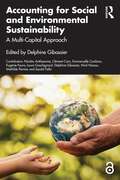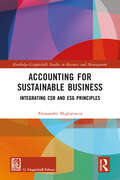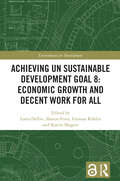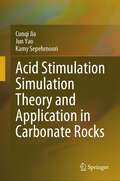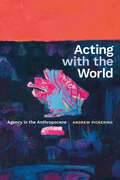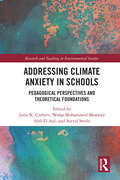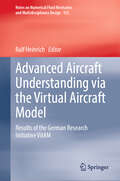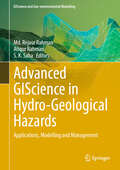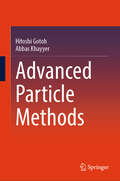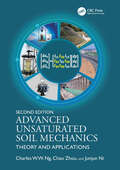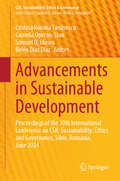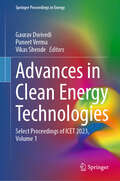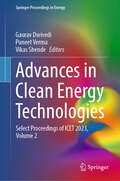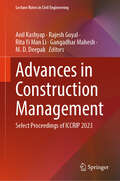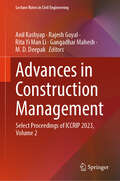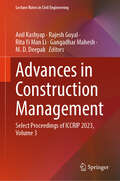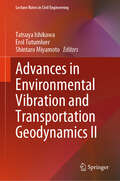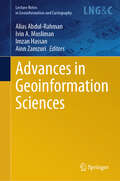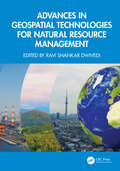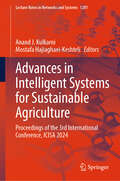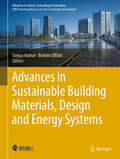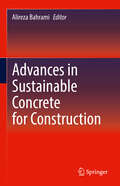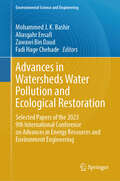- Table View
- List View
Accounting for Social and Environmental Sustainability: A Multi-Capital Approach (Routledge Studies in Accounting)
by Delphine GibassierFor a company, managing its social and environmental performance is no longer just a matter of reducing its impact; it must also be able to assess its contribution to resolving or aggravating social and environmental problems. This book argues that the current work on accounting for sustainability has not yet given organisations a tool to integrate their performance within the planetary and social framework that conveys actual "planetary and social budgets", and that business organisations lack the possibility to go beyond incremental performance measurement.It offers an in‑depth examination of multi‑capital accounting, which has already been integrated within the Corporate Sustainability Reporting Directive and will follow on from sustainability reporting. The LIFTS model (Limits and Foundations Towards Sustainability Accounting Model) used in this book combines various scientific and practical contributions to develop budgets for environmental impacts and social obligations on an organisational scale. It proposes an accounting mechanism that enables an organization to manage each of its budgets and measure variances between forecast and actual. It provides an introduction to the principles of this model and its conditions of application and describes its implementation in numerous companies.While the main audience for the book is academics, advanced students and researchers in accounting for sustainability, business and management and economics, it will also appeal to practitioners, policymakers, national standard setters, think tanks and non-governmental organizations (NGOs).
Accounting for Sustainable Business: Integrating CSR and ESG Principles (Routledge-Giappichelli Studies in Business and Management)
by Alessandro MigliavaccaThe role of firms, corporations, and businesses in shaping social outcomes has long been a key area of focus for economics and business scholars. With growing attention on addressing climate change, reducing social inequalities, and upholding human rights, there is an increasing interest in how corporate activities impact society. This book examines these pressing issues through the lens of fundamental theories of the firm, particularly drawing on the Italian tradition of Economia Aziendale, which views the firm as a vehicle for meeting human needs and generating social value.The book begins by introducing the anthropocentric theory of the firm and explores the connection between accounting practices and sustainable management. It offers a thorough review of the literature on Corporate Social Responsibility (CSR) and Environmental, Social, and Governance (ESG) practices, highlighting key aspects of the extensive body of work in this field. The analysis is grounded in the context of evolving regulations, especially within the EU, that underscore the importance of considering both financial and sustainability factors. Rational management theory is expanded to include sustainability accounting, showcasing its pivotal role in corporate decision-making. The book provides detailed guidance on the integrated knowledge acquisition process, showing how companies can systematically identify and assess their social and environmental impacts. This process is further illustrated through a hypothetical reality-based case study, demonstrating its application in a practical context. The book concludes with an exploration of current trends and future directions in sustainability accounting.It serves as a valuable resource for academics, practitioners, and anyone interested in the intersection of corporate governance, accounting, and sustainability.
Achieving UN Sustainable Development Goal 8: Economic Growth and Decent Work For All (Environment for Development)
by Gunnar Köhlin Lotta Dellve Sharon Fonn Katrin SkagertThis book brings together knowledge on how to achieve the UN Sustainable Development Goal 8, to bring societal change through sustainable economic growth and decent work for all by 2030.At its core is the great challenge of achieving economic growth without compromising the environment, while ensuring respect for fundamental human rights, and in particular the right to employment with equal and safe work conditions. This book provides a critical analysis of Sustainable Development Goal (SDG) 8 in the 2030 Agenda, its targets and indicators, to reveal biases, tensions and contradictions that need to be addressed to achieve this goal and to guide policymaking. The role and potential of academia to contribute to achieving this SDG is scrutinized. Chapters examine and assess specific targets for SDG 8, which includes policies, resource efficiency, youth employment, child labour and sustainable tourism. Higher education institutions’ tools for capacity building are presented, examining how education and academic research can play a role in achieving the SDG 8 targets. Overall, this book offers a synthesis of how research and higher education can make a difference in achieving a complex SDG.This book will be of great interest to academics and professionals working on the United Nations Sustainable Development Goals and can be used as a policymaking guide for 2030 and beyond.
Acid Stimulation Simulation Theory and Application in Carbonate Rocks
by Jun Yao Cunqi Jia Kamy SepehrnooriThis book provides a theoretical basis and technical support for carbonate acid stimulation design. Carbonate reservoirs are one of the most important sources of fossil fuels. Acid stimulation is an effective technique for enhancing reservoir performance and boosting production. The book stands as a fundamental guide in implementing acid stimulation techniques in carbonate reservoirs. It models the acid stimulation process, contemplating mass, momentum, and energy changes alongside the real mineral composition of the carbonate rock matrix. Comprehensive sensitivity studies are conducted to elucidate the targeted mechanisms and optimization principles for designing acid stimulation applications in carbonate reservoirs. This book also serves as an excellent foundation for numerical simulation, providing detailed descriptions of how finite volume methods and sequential decoupling algorithms are utilized for numerical discretization and solving decoupled solutions on staggered grids. This book is an essential reference for reservoir engineers, academics, and students interested in studying and performing acid stimulation in carbonate reservoirs. It also helps readers obtain an understanding of modeling reactive flow in porous media with coupling multi-physical fields, including hydrologic–chemical-thermal processes and multi-scale characteristics. In addition, this book also delves into scale-up methods, such as the fundamental theoretical foundations and important theorems of the volume averaging approach. The book is used as a textbook for senior undergraduate and graduate courses in petroleum engineering.
Acting with the World: Agency in the Anthropocene
by Andrew PickeringIn the Anthropocene our actions are coming home to roost. Global warming, species extinctions, and environmental disasters are the dark side of our mastery of nature. In Acting with the World, Andrew Pickering identifies a different pattern of being and doing that can evade this dark side, a pattern that he calls acting-with the world. In contrast to our usual practice of acting on the world, acting-with foregrounds nonhuman or more-than-human agency and aims to attune our practices to the propensities of nature. Pickering explores examples of acting-with from around the globe, including flood control on the Mississippi River, ecosystem restoration on the Colorado River, the Room for the River project and rewilding in the Netherlands, natural farming in Japan, Aboriginal fire techniques in Australia, and Amazonian shamanism. Pickering argues that acting-with intimately and gracefully plugs us into nature, undercuts the Anthropocene from below, and offers a constructive approach to addressing otherwise intractable wicked problems.
Addressing Climate Anxiety in Schools: Pedagogical Perspectives and Theoretical Foundations (Research and Teaching in Environmental Studies)
by Julie K. Corkett Astrid Steele Wafaa Mohammed Moawad Abd-El-AalThis monograph presents a contemporary examination of climate anxiety within schools. Featuring contributions from experts across Canada, Austria, Australia, New Zealand, the United Kingdom, Italy, and Finland, the book underscores the prevalence of climate anxiety, a phenomenon often overlooked in discussions about climate change and education. The monograph is divided into two sections. The first section begins by outlining how climate anxiety manifests in schools, examining the theoretical underpinnings of climate change education and its psychological impact on students and teachers. The second section presents innovative and practical strategies for mitigating climate anxiety in the classroom, highlighting the importance of cohesive learning environments and cross-curricular approaches. Readers will benefit from the book’s international perspective and its blend of theory and practice, gaining valuable insights into how to address climate anxiety and foster resilience in educational contexts.An international, empirical, and ethnographic evidence-based perspective of climate anxiety in classroom, this book will appeal to scholars, researchers, postgraduate students, and educators with interests in climate change education, sustainability education, policy and administration, mental health, and pedagogy.
Advanced Aircraft Understanding via the Virtual Aircraft Model: Results of the German Research Initiative VitAM (Notes on Numerical Fluid Mechanics and Multidisciplinary Design #155)
by Ralf HeinrichThis book reports on the results of a four-year collaborative project between the German Aerospace Center (DLR), three German universities and the aircraft industry. The project was funded by the Ministry for Economic Affairs and Climate Action. In the book, different subprojects are presented, with their corresponding case studies. Readers will find extensive information on simulation strategies required for virtual flight testing, and verification and validation aspects. All in all, this book offers a timely update on the state-of-the-art in flow simulation techniques, flight mechanics methods, integrated multidisciplinary simulation, reduced-order models, and on the development of processes for automated generation of aerodynamic databases. It addresses both researchers and professionals in the field of aviation engineering.
Advanced GIScience in Hydro-Geological Hazards: Applications, Modelling and Management (GIScience and Geo-environmental Modelling)
by Atiqur Rahman Md. Rejaur Rahman S. K. SahaIn recent decades, natural hazards have increasingly threatened lives, livelihoods, and economies, with annual losses totalling billions of dollars globally. According to the Insurance Information Institute (III) and the Zebra, USA, natural disaster losses reached $74.4 billion in 2020, and an average of 6,800 natural disasters occur each year, claiming around 1.35 million lives. Hydrological and geological hazards, in particular, have significant societal and environmental impacts, making them critical areas of research. Understanding and mitigating these hazards is vital for developing legal mechanisms related to environmental restoration, societal improvements, and sustainable development. Modern technologies and earth observation data play a crucial role in disaster monitoring, prediction, modelling, and management. Recent advancements in geoinformation science have introduced multi-source data for natural hazards research. In addition, cutting-edge methods such as machine learning, deep learning, and big data science offer powerful tools for in-depth studies of natural hazards through remote sensing and geoinformatics. This book, Advanced GIScience in Hydro-Geological Hazards, presents up-to-date contributions on applying advanced GIScience to research various hydro-geological hazards, including floods, landslides, tropical cyclones, soil erosion, coastal erosion, riverbank erosion, coastal area vulnerability, drought, wetlands shrinking etc. It also explores multi-hazard studies using SAR, GNSS, and other innovative methods. The chapters focus on integrating artificial intelligence, machine learning techniques, and remote sensing to enhance preparedness, response, and resilience against these hazards. Targeting a broad audience of academics, scientists, students, environmentalists, government agencies, disaster planners, and GIS experts, this book aims to showcase the latest advancements in GIScience for assessing and managing hydro-geological hazards. It offers strategies for disaster risk reduction and capacity building, providing readers with the knowledge needed to address pressing environmental challenges.
Advanced Particle Methods
by Hitoshi Gotoh Abbas KhayyerThis book provides an in-depth, comprehensive, and comprehensible description of the theoretical background and numerical methodologies corresponding to advanced particle methods formulated in classical Newtonian mechanics for simulation of fluids, structures, and their interactions. Particle methods are regarded as new-generation computational technology with a broad range of applications in engineering and science. Advanced particle methods refer to the latest developed particle methods with high stability, accuracy, conservation, and convergence properties. Distinctively, the described advanced particle methods are characterized by a clear, consistent mathematical–physical background, the absence of artificial numerical stabilizers that often require parameter tuning, rigorous satisfaction of boundary conditions, and excellent numerical results that have been extensively and scrupulously verified with respect to reliable analytical and experimental reference solutions. This book presents a unified description for both smoothed particle hydrodynamics (SPH) and moving particle semi-implicit (MPS) methods through a coherent presentation of fundamental equations, and numerical algorithms and schemes. Special attention is devoted to meticulous and coherent explanation of the advanced particle methods such that even undergraduate students can follow the derivation process and thoroughly understand the concepts and equations. The state-of-the-art particle method technology is also portrayed with the presentation of developed multi-physics, multi-scale particle methods corresponding to multi-phase flows, and hydroelastic fluid–structure interactions with rigorous treatment of interfacial moving boundaries.
Advanced Remote Sensing Technology for Covid-19 Monitoring and Forecasting
by Maged MarghanyThis book provides a groundbreaking exploration of satellite remote sensing's role in tracking the mobility and spread of COVID-19, focusing on its origin in Wuhan City. It addresses the gap in research by employing advanced techniques like quantum image processing to analyze satellite data and differentiate between COVID-19-related deaths and other causes. Additionally, it explores conspiracy theories, vaccine development through quantum mechanics, and the use of quantum computing for detecting pandemic patterns. The book also delves into the economic impact of COVID-19, offering a scientific response to geopolitical tensions and media accusations surrounding the pandemic's origins.
Advanced Unsaturated Soil Mechanics: Theory and Applications
by Junjun Ni Charles W.W. Ng Chao ZhouUnsaturated soil is a three-phase material that is ubiquitous on the Earth’s surface and exhibits complex behaviour, which becomes more complex in response to the Earth’s changing climate and increasing engineering activities. This is because the former affects its moisture and temperature conditions significantly and the latter governs its stress state and suction condition. This book is designed to meet the increasing challenges of climate change and engineering activities by covering the mechanics and engineering of unsaturated soil in a logical manner. It comprises four major parts: Water retention and flow characteristics Shear strength and stiffness at various temperatures State-dependent elasto-plastic constitutive modelling Field monitoring and engineering applications This second edition uniquely covers fundamental topics on unsaturated soil that are not covered in other similar books, including: the state- dependency of soil- water retention behaviour and water permeability functions, such as dependence on engineering activities small strain stiffness considering the influence of wetting- drying cycles and recent suction history, such as that due to climate change suction effects on dilatancy and peak shear strength cyclic thermal effects on soil behaviour state- dependent elastoplastic constitutive modelling of monotonic and cyclic behaviour engineering applications such as the South-to-North Water Transfer Project; an earthen landfill cover system devoid of geomembrane in the Xiaping landfill, Shenzhen; and a 15-m-deep multi- propped excavation in Tianjin, China
Advancements in Sustainable Development: Proceedings of the 10th International Conference on CSR, Sustainability, Ethics and Governance, Sibiu, Romania, June 2024 (CSR, Sustainability, Ethics & Governance)
by Samuel O. Idowu Belén Díaz Díaz Camelia Oprean-Stan Cristina Roxana TănăsescuThis book gathers selected contributions from the 10th Annual Conference of the Global Corporate Governance Institute, held in Sibiu, Romania on June 12 - 14, 2024. Its chapters present the work of internationally respected scholars and experts, focusing on corporate social responsibility, sustainability, ethics, corporate governance, finance, and responsible investing. In this context, it highlights the latest research findings on responsible action and their practical implications for business, society, science, and politics. The book pursues an integrated and multidisciplinary approach and equips readers with the knowledge they require for implementing holistic and effective sustainability strategies in organizations and educational institutions. Accordingly, it offers a valuable resource for academics, policymakers, business leaders, and sustainability practitioners who want to drive meaningful change for a sustainable future.
Advances in Clean Energy Technologies: Select Proceedings of ICET 2023, Volume 1 (Springer Proceedings in Energy)
by Puneet Verma Gaurav Dwivedi Vikas ShendeThis book presents select peer-reviewed proceedings of the International Conference on Innovations in Clean Energy Technologies (ICET 2023) and examines a range of durable, energy-efficient, and next-generation smart green technologies for a sustainable future by reflecting on the trends, advances, and developments taking place across the globe. The topics covered include smart technologies-based products, energy-efficient systems, solar and wind energy, carbon sequestration, green transportation, green buildings, energy material, biomass energy, smart cities, hydropower, bio-energy, and fuel cells. The book also discusses various performance attributes of these clean energy technologies and their workability and carbon footprint. The book is a valuable reference for beginners, researchers, and professionals interested in clean energy technologies.
Advances in Clean Energy Technologies: Select Proceedings of ICET 2023, Volume 2 (Springer Proceedings in Energy)
by Puneet Verma Gaurav Dwivedi Vikas ShendeThis book contains select peer-reviewed proceedings from the International Conference on Innovations in Clean Energy Technologies (ICET 2023). It explores a variety of durable, energy-efficient, and next-generation smart green technologies aimed at promoting a sustainable future. The topics covered include smart technology-based products, energy-efficient systems, solar and wind energy, carbon sequestration, green transportation, green buildings, energy materials, biomass energy, smart cities, hydropower, bio-energy, and fuel cells. The book also discusses the performance attributes of these clean energy technologies, as well as their workability and carbon footprint. It is a valuable reference for beginners, researchers, and professionals interested in clean energy technologies.
Advances in Construction Management: Select Proceedings of ICCRIP 2023 (Lecture Notes in Civil Engineering #238)
by Anil Kashyap Rita Yi Man Li Rajesh Goyal Gangadhar Mahesh M. D. DeepakThis book presents the select proceedings of the 7th International Conference on Construction, Real Estate, Infrastructure, and Project Management (ICCRIP 2023) and explores recent and innovative developments in all aspects of the CRIP sector. The book covers various issues in construction management, advancements in construction technologies and materials, sustainable construction practices, managerial issues in the CRIP sector, construction 4.0, project management, real estate and urban planning, energy, environment and sustainability. The book will be useful for researchers and professionals involved in construction management, civil engineering and related fields.
Advances in Construction Management: Select Proceedings of ICCRIP 2023, Volume 2 (Lecture Notes in Civil Engineering #601)
by Anil Kashyap Rita Yi Man Li Rajesh Goyal Gangadhar Mahesh M. D. DeepakThis book presents the select proceedings of the 7th International Conference on Construction, Real Estate, Infrastructure, and Project Management (ICCRIP 2023) and explores recent and innovative developments in all aspects of the CRIP sector. The book covers various issues in construction management, advancements in construction technologies and materials, sustainable construction practices, managerial issues in the CRIP sector, construction 4.0, project management, real estate and urban planning, energy, environment and sustainability. The book will be useful for researchers and professionals involved in construction management, civil engineering and related fields.
Advances in Construction Management: Select Proceedings of ICCRIP 2023, Volume 3 (Lecture Notes in Civil Engineering #618)
by Anil Kashyap Rita Yi Man Li Rajesh Goyal Gangadhar Mahesh M. D. DeepakThis book presents the select proceedings of the 7th International Conference on Construction, Real Estate, Infrastructure, and Project Management (ICCRIP 2023) and explores recent and innovative developments in all aspects of the CRIP sector. The book covers various issues in construction management, advancements in construction technologies and materials, sustainable construction practices, managerial issues in the CRIP sector, construction 4.0, project management, real estate and urban planning, energy, environment and sustainability. The book will be useful for researchers and professionals involved in construction management, civil engineering and related fields.
Advances in Environmental Vibration and Transportation Geodynamics II (Lecture Notes in Civil Engineering #588)
by Erol Tutumluer Tatsuya Ishikawa Shintaro MiyamotoThis book compiles papers from the 9th International Symposium on Environmental Vibration and Transportation Geodynamics (ISEV2024) held on March 6–8, 2024, in Sapporo, Japan. The latest advances are covered in the areas of environmental vibrations induced by industrial, civilian and transportation activities, problems associated with dynamic vehicular loading on road and railway foundations and sustainability challenges of transportation infrastructures and the built environment. The book can be a valuable reference for researchers and professionals interested in transportation geodynamics and allied fields.
Advances in Geoinformation Sciences (Lecture Notes in Geoinformation and Cartography)
by Alias Abdul-Rahman Ivin A. Musliman Imzan Hassan Ainn ZamzuriProceedings of ESRI Users Conference series (by ESRI California); - This book provides discussions on the usage of the specific software like ArcGIS Pro, thus, unlike the intended book which is more advanced solutions and methods. Proceedings of 31st ACM International Conference (by ACM); - This book offers specific solutions to the computing and spatial science community but more for system developers etc, whereas this intended book has broader knowledge spectrum. Proceedings of 18th 3D Geoinfo International Conference (Springer). - This book specifically discusses on 3D GIS research, whereas the intended book gives more breadth thus offers extra insights to the knowledge.
Advances in Geospatial Technologies for Natural Resource Management
by Ravi Shankar DwivediTimely and reliable information on natural resources, regarding their potential and limitations, is a prerequisite for sustainable development. Geospatial technologies offer immense potential in providing such information in a timely and cost-effective manner. Using orbital sensors data in conjunction with airborne and proximal sensors data to generate information on soils and agricultural resources, forests, mineral resources, fossil fuel, wetlands, water resources, and marine resources, this book focuses on the advancements in technologies applicable to managing these resources. It addresses global issues like climate change and land degradation neutrality and introduces spatial data infrastructure (SDI) as a mechanism for sharing geospatial data. This book also provides an in-depth discussion on drones, crowdsourcing, cloud computing, Internet of Things, machine learning, and their applications.FEATURES Contains a comprehensive resource on the latest developments in geospatial technologies and their use in monitoring natural resources, productivity mapping, and modeling Explains the geo-computation methods and online algorithm developments Includes clear guidance on how best to use geospatial data for various applications Discusses case studies from a variety of fields and current trends in the management of natural resources Provides future scenarios concerning platforms, sensors, data analysis, and interpretation techniques This book is written for remote sensing and GIS professionals in environmental institutions and government who are involved in natural resource management projects. Senior undergraduate and graduate-level students in Earth sciences, geography, or environmental management can also use this text for supplementary reading.
Advances in Intelligent Systems for Sustainable Agriculture: Proceedings of the 3rd International Conference, ICISA 2024 (Lecture Notes in Networks and Systems #1201)
by Anand J. Kulkarni Mostafa Hajiaghaei-KeshteliThis book presents the select proceedings of the 3rd International Conference on Intelligent Systems and Applications 2023. The theme of this conference is ‘Intelligent Systems for Agricultural Applications'. It covers the topics of intelligent systems in multiple aspects such as sustainable crop production, weather prediction, post-harvest management and agro-processing, digitalization and automation of agri equipment, agriculture warehouse and supply chain management, yield prediction, and quality assessment. The book is useful for researchers and professionals interested in the broad field of artificial intelligence and machine learning.
Advances in Sustainable Building Materials, Design and Energy Systems (Advances in Science, Technology & Innovation)
by Sanjay Kumar Brahim ElBhiriThis book is a great opportunity to make the research community discuss the dangerous environmental challenges such as climate change and its huge effects in addition to the world's reliance on fossil fuel and non-renewable resources. In recent years, the authors have been focused on the advancements of technology and how it can improve our lives, but the authors often overlook the fact that it is creating an unsustainable approach that comes at a high cost which makes a sustainable approach to cities necessary, focusing on accessible public transport, energy, water, and food security, and regenerating compact fabric areas. To discuss how to reach this sustainable approach, IEREK held the Advances in Energy Research, Materials Science and Built Environment (EMBE) conference from October 3 to 4, 2024, with attendees from all over the world. It provides an opportunity to exchange ideas and solutions on urban planning, sustainable architecture, climate change mitigation, and innovative design. The EMBE conference hosts a variety of knowledgeable keynote speakers and researchers who discussed the integration of technology in sustainable urban planning, green urbanism, preservation of coastal areas, innovative renewable materials, and responsive architecture. The book covers a wide range of scientific knowledge that can lead humanity toward a sustainable and greener future.
Advances in Sustainable Concrete for Construction
by Alireza BahramiThis book offers groundbreaking insights into transforming the concrete industry with innovative, environmentally conscious solutions. It explores the latest advancements in sustainable technologies, including climate-improved concrete, green binders, recycled materials, and high-performance composites. It also covers the optimization of reinforced concrete structures, load-bearing columns and beams replacements, as well as non-destructive testing methods for predicting concrete performance. Additionally, it investigates engineered cementitious composites, internally cured concrete, and industrial by-products to address pressing environmental challenges in construction. An indispensable reference for engineers, architects, and researchers shaping the future of sustainable infrastructure and reducing carbon footprints
Advances in Watersheds Water Pollution and Ecological Restoration: Selected Papers of the 2023 9th International Conference on Advances in Energy Resources and Environment Engineering (Environmental Science and Engineering)
by Fadi Hage Chehade Zawawi Bin Daud Mohammed J. K. Bashir Aliasgahr EnsafiThis book provides a glimpse into the cutting-edge research on pollution management and detection in the water environments of watersheds, covering topics like water pollution traceability, pollution monitoring, and management techniques. According to the United Nations World Water Development Report provided by the World Water Forum, millions of tons of garbage are dumped into rivers, lakes, and streams around the world every day, and every liter of wastewater pollutes eight liters of freshwater, causing a serious damage to the water environment in watersheds. The protection and prevention of water in watersheds, which is related to freshwater resources for human development and survival, has always been a crucial research direction in the field of environmental engineering. This book aims to promote the exchange of scientific information among scholars from the world's leading universities, research centers, and high-tech companies and is of great benefit to researchers and professionals in the field of environmental control of watershed management.
Adventures in Backyard Gardening: Inspiring Young Gardeners to Grow Their Own Food (The Adventures Series)
by Ron SmithAuthor is a Environmental Science Educator, Citizen/Community Science Project Leader, and Curriculum Writer The health of the planet and of humanity is connected to food. Where our food comes from matters. How our food is grown matters. The diversity of our food matters. With so many educational initiatives, if kids learn early, it becomes an enduring part of their lives.
